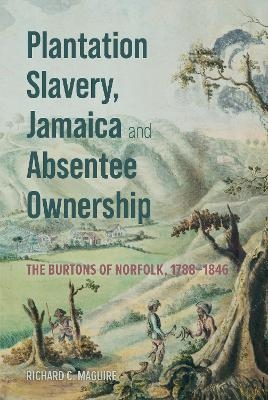
Plantation Slavery, Jamaica and Absentee Ownership
The Boydell Press (Verlag)
978-1-83765-124-5 (ISBN)
While the Atlantic plantation economy covered vast areas of the globe and saw the largest forced movement of people in human history, any global history is the sum of myriad local stories. This book recounts one of them. It is the story of a Norfolk family, the Burtons, who owned the Chiswick sugar estate on the island of Jamaica. The family inherited the estate in 1788 and for fifty-eight years ran it from Norfolk and Suffolk as 'absentee' landlords.
Drawing on new archival research in Britain, the United States and Jamaica, this book makes an important intervention to our understanding of key debates in the economic history of plantation slavery: the decline of the planter class, the importance of British abolitionism, the way in which plantations were operated, the mechanics of absentee ownership, and, importantly, the lives of the enslaved people whose exploitation sustained the entire system. Although the story of Chiswick's enslaved workers before the late 1820s is difficult to reconstruct, its traces can be gleaned from the accounting records and letters of the estate's owners. Their story illuminates the economic data and managerial letters and reveals that Chiswick's workers were crucial in shaping the history of the estate. From the 1830s the workers' activity became central, as they responded to emancipation by gradually asserting their rights. In the end, it was the action of the formerly enslaved workers that made the Burtons' continuing ownership of the Chiswick estate economically unviable. While the wider context of abolition made this possible, it was the response of these workers, including strike actions, which decided the fate of the absentee-owned Chiswick sugar estate.
RICHARD C. MAGUIRE is an Honorary Senior Lecturer in the School of History, UEA. He is the author of Africans in East Anglia, 1467-1833 (Boydell Press, 2021).
RICHARD C. MAGUIRE is Honorary Senior Lecturer in the School of History at the University of East Anglia, Norwich. He is the author of Africans in East Anglia, 1467-1833 (Boydell Press, 2021).
List of Illustrations
Acknowledgements
Note to the Reader
Introduction: 'A very considerable fortune': The Burton family, plantation slavery and absentee ownership in Jamaica and Norfolk
1. 'A very sensible good sort of man': The Burton family and the Chiswick Estate, 1700-1788
2. 'Judicious management': Absentee ownership in the late eighteenth century, 1788-1797
3. 'Delightfully situated': A Burton in Jamaica, 1798-1801
4. 'A most unexpected and severe stroke of fate': A new generation and abolition, 1802-1815
5. Lucy Wallen and the people of Chiswick: Amelioration and decline, 1816-1822
6. 'Looking forward to great things being done': A new plan, 1823-1828
7. 'A state of insubordination': Worker unrest and financial crisis, 1829-1834
8. 'What free is this?': The challenges of apprenticeship, 1834-1838
9. 'Ruin must ensue': Freedom and the collapse of Chiswick, 1838-1846
Postscript: 'Chiswick, an abandoned sugar estate in the parish of St Thomas-ye-East'
Bibliography
| Erscheinungsdatum | 30.08.2024 |
|---|---|
| Zusatzinfo | 2 b/w illus. |
| Verlagsort | Woodbridge |
| Sprache | englisch |
| Maße | 156 x 234 mm |
| Gewicht | 398 g |
| Themenwelt | Geisteswissenschaften ► Geschichte ► Regional- / Ländergeschichte |
| Geschichte ► Teilgebiete der Geschichte ► Wirtschaftsgeschichte | |
| ISBN-10 | 1-83765-124-8 / 1837651248 |
| ISBN-13 | 978-1-83765-124-5 / 9781837651245 |
| Zustand | Neuware |
| Haben Sie eine Frage zum Produkt? |
aus dem Bereich


